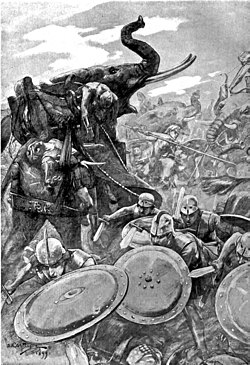Pertempuran Sungai Hydaspes
| Pertempuran Hydaspes | |||||||||
|---|---|---|---|---|---|---|---|---|---|
| Bagian dari Perang Aleksander yang Agung | |||||||||
 Lukisan oleh Andre Castaigne yang menggambarkan phalanx menyerang pusat barisan pada Pertempuran Hydaspes | |||||||||
| |||||||||
| Pihak terlibat | |||||||||
|
Kekaisaran Makedonia sekutu Yunani sekutu Persia sekutu India | Paurava | ||||||||
| Tokoh dan pemimpin | |||||||||
|
Aleksander yang Agung, Krateros, lainnya tidak diketahui |
Raja Puru, lainnya tidak diketahui | ||||||||
| Kekuatan | |||||||||
|
34,000 infantri, 7,000 kavaleri.[3][4] |
20,000,[5] 30,000[6] atau 50,000[7] infantri, 2,000 [5] - 4,000[6] kavaleri, 200,[6] 130[7] ("yang paling mungkin" menurut Green),[8] or 85[9] gajah perang, 1,000 kereta perang.[10] | ||||||||
| Korban | |||||||||
|
80[11] - 700[12][13] infantri, 230[11] - 280[12] kavaleri terbunuh. | 12,000 terbunuh and 9,000 ditawan,[14] atau 23,000 terbunuh,[11] termasuk gajah perang dan prajurit kereta perang. | ||||||||
Pertempuran Sungai Hydaspes adalah pertempuran antara Aleksander yang Agung melawan Raja Puru pada 326 SM di tepian Sungai Hydaspes (Jhelum) di daerah Punjab dekat Bhera (Pakistan modern). Kerajaan Paurava yang dipimpin oleh Raja Puru terletak di Punja. Pertempuran ini adalah pertempuran besar terakhir yang dilakukan oleh Aleksander.[15] Raja Puru dan pasukannya melawan pasukan Aleksander dengan sengit dan keras. Aleksander bahkan merasa kagum pada pasukan Raja Puru yang gagah berani.[16]
Meskipun menang, pasukan Aleksander menjadi sangat kelelahan. Mereka pun menolak untuk pergi lebih jauh lagi di India. Akhirnya, setelah menaklukan beberapa klan India di sekitar sungai Indus dan mendirikan kota-kota yang akan berfungsi sebagai pos terdepan serta pusat perdagangan, Aleksander kembali ke Babilonia.
Catatan kaki
[sunting | sunting sumber]- ^ Fuller, hlm 198
"While the battle raged, Craterus forced his way over the Haranpur ford. When he saw that Alexander was winning a brilliant victory he pressed on and, as his men were fresh, took over the pursuit."
- ^ Fuller, pg 181
"Among the many battles fought by invaders who entered the plains of India from the north-west, the first recorded in history is the battle of the Hydaspes, and in Hogarth's opinion, when coupled with the crossing of the river, together they 'rank among the most brilliant operations in warfare'."
- ^ According to Arrian 5.14, 6,000 foot and 5,000 horse were under Alexander's command in the battle.
- ^ Fuller estimates a further 2,000 cavalry under Craterus' command.
- ^ a b Plutarch 62.1:
"But this last combat with Porus took off the edge of the Macedonians' courage, and stayed their further progress into India. For having found it hard enough to defeat an enemy who brought but twenty thousand foot and two thousand horse into the field, they thought they had reason to oppose Alexander's design of leading them on to pass the Ganges, too, which they were told was thirty-two furlongs broad and a fathom deep, and the banks on the further side covered with multitudes of enemies."
- ^ a b c Arrian, 5.15
- ^ a b Diodorus, 17.87.2
- ^ Green, p. 553
- ^ Curtius 8.13.6; Metz Epitome 54 (following Curtius)
- ^ Plutarch 60.5
- ^ a b c Arrian, 5.18
- ^ a b Diodorus 17.89.3
- ^ According to Fuller, pg 199, "Diodorus' figures appear more realistic."
- ^ Diodorus 17.89.1-2
- ^ Peter Connolly. Greece and Rome At War. Macdonald Phoebus Ltd, 1981, hlm. 66
- ^ Fuller, hlm. 198.
Referensi
[sunting | sunting sumber]Kuno
[sunting | sunting sumber]- Diodoros Sikolos (90-30 SM). Bibliotheka Historika.
- Quintus Curtius Rufus (60-70 SM). Historiae Alexandri Magni.
- Plutarch (75 SM). The Life of Alexander the Great Diarsipkan 2007-02-21 di Wayback Machine., Parallel Lives.
- Arrian (awal abad ke-2 M).
- Metz Epitome.
Modern
[sunting | sunting sumber]- Fuller, John (1960). The Generalship of Alexander the Great. New Jersey: De Capo Press. ISBN 978-0-306-80371-0
- Green, Peter (1974). Alexander of Macedon: A Historical Biography. ISBN 978-0-520-07166-7
- Harbottle, Thomas Benfield (1906). Dictionary of Battles. New York.
- Rogers, Guy (2004). Alexander: The Ambiguity of Greatness. New York: Random House.
Pranala luar
[sunting | sunting sumber]- (Inggris) Hydaspes (Jhelum) Diarsipkan 2018-12-26 di Wayback Machine.
- (Inggris) Peta Pertempuran Sungai Hydaspes Diarsipkan 2010-08-01 di Wayback Machine. oleh Jonathan Webb
